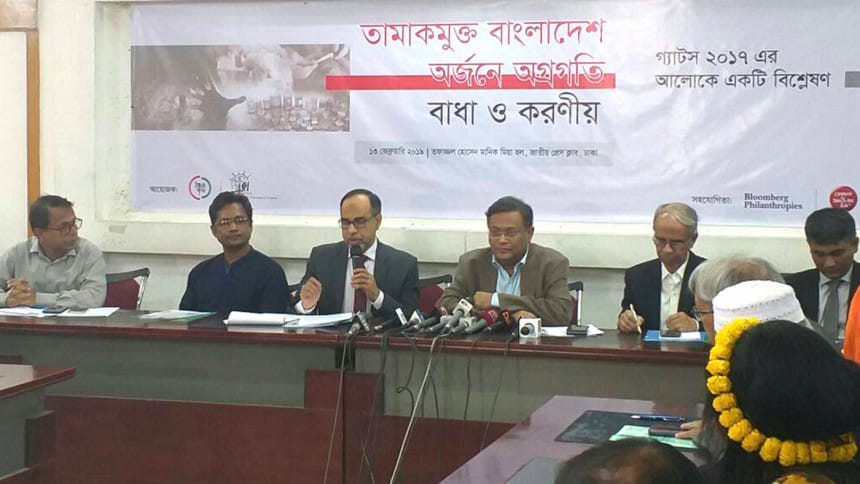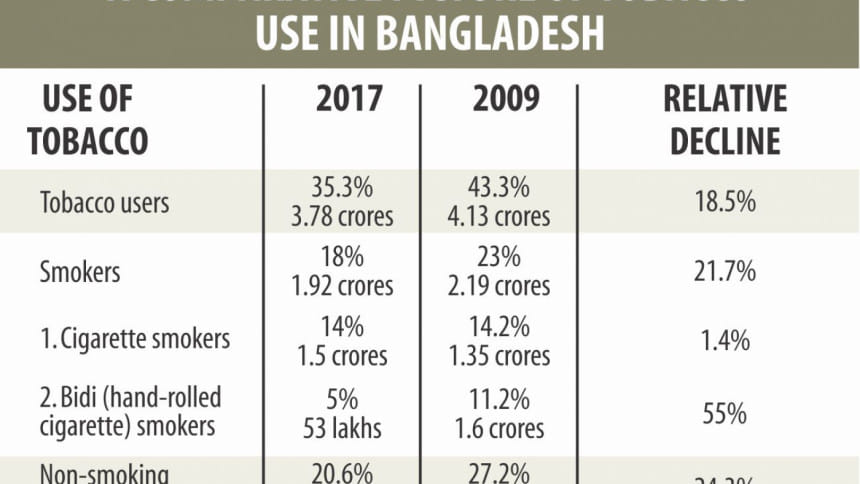Tobacco usage drops by 18.5pc in 8 years

Tobacco usage among those aged 15 and above in Bangladesh dropped by 18.5 percent in the last eight years, till 2017, finds the Global Adult Tobacco Survey (GATS).
Anti-tobacco campaigners welcomed the significant reduction in tobacco usage, but observed that the progress was not enough to turn Bangladesh into a tobacco-free country by 2040.
Findings of the survey were unveiled at a discussion jointly organised by Progotir Jonno Gyan (Progga), an anti-tobacco research organisation, and Anti-Tobacco Media Alliance (ATMA) at Jatiya Press Club in the capital yesterday.
In 2009, over 43 percent of the country's population aged 15 and above (about 4.13 crore) used various smoking and smokeless tobacco products, like cigarette and "jorda". But it came down to 35.3 percent (about 3.78 crore) in 2017, said the survey.
Some government initiatives -- such as amendment of tobacco law and pictorial health warning on all tobacco packaging -- and anti-tobacco campaigns by different non-government organisations worked as the key factors behind the decline, it said.
GATS is an initiative of World Health Organization (WHO), which was carried out in the country in 2009 and repeated in 2017 with support of Bangladesh Bureau of Statistics and National Tobacco Control Cell.
The survey, which was conducted in 30 countries including India, Mexico and Thailand, was published in August last year.
Yesterday's discussion was organised to review the findings and identify the way forward.
According to GATS, over 20 percent of the country's population currently use smokeless tobacco -- mostly betel quid (paan) with chewing tobacco and powdered tobacco (gul); 18 percent use smoking tobacco products, mostly cigarettes and bidi.
The number of bidi smokers declined more than half than it was in 2009, but the percentage of cigarette smokers remained almost unchanged (around 14 percent), the survey found.
It also found that tobacco usage among the male population reduced more (20.8 percent) than that of females (12.2 percent).
Besides, exposure to second-hand smoke at home and public places -- like markets and restaurants -- and workplace also reduced notably.
“The outcome is a result of the efforts of the government and the non-government sectors. But our organisation doesn't think that progress was made as per expectation. There is a long way to go,” said Hasan Shahriar, coordinator of Progga.
Public places are still not smoke-free, and the usage of smokeless tobacco is happening in an uncontrolled manner.
At the same time, the price of cigarettes is still not beyond the reach of general people, said Hasan.

The government has to address the issues and take immediate measures to turn the country tobacco-free by 2040, he said, while presenting the survey findings.
He suggested that the government implement Smoking and Usage of Tobacco Products (Control) Act strictly, impose higher tax on tobacco products, and cut ties with tobacco companies to avoid their influence.
He also suggested focused monitoring of Mymensingh and Sylhet as the use of tobacco is much higher in these two divisions.
Information Minister Dr Hasan Mahmud, Health Ministry Secretary Asadul Islam and Progga Executive Director ABM Zubair, among others, spoke at the discussion.

 For all latest news, follow The Daily Star's Google News channel.
For all latest news, follow The Daily Star's Google News channel. 






Comments